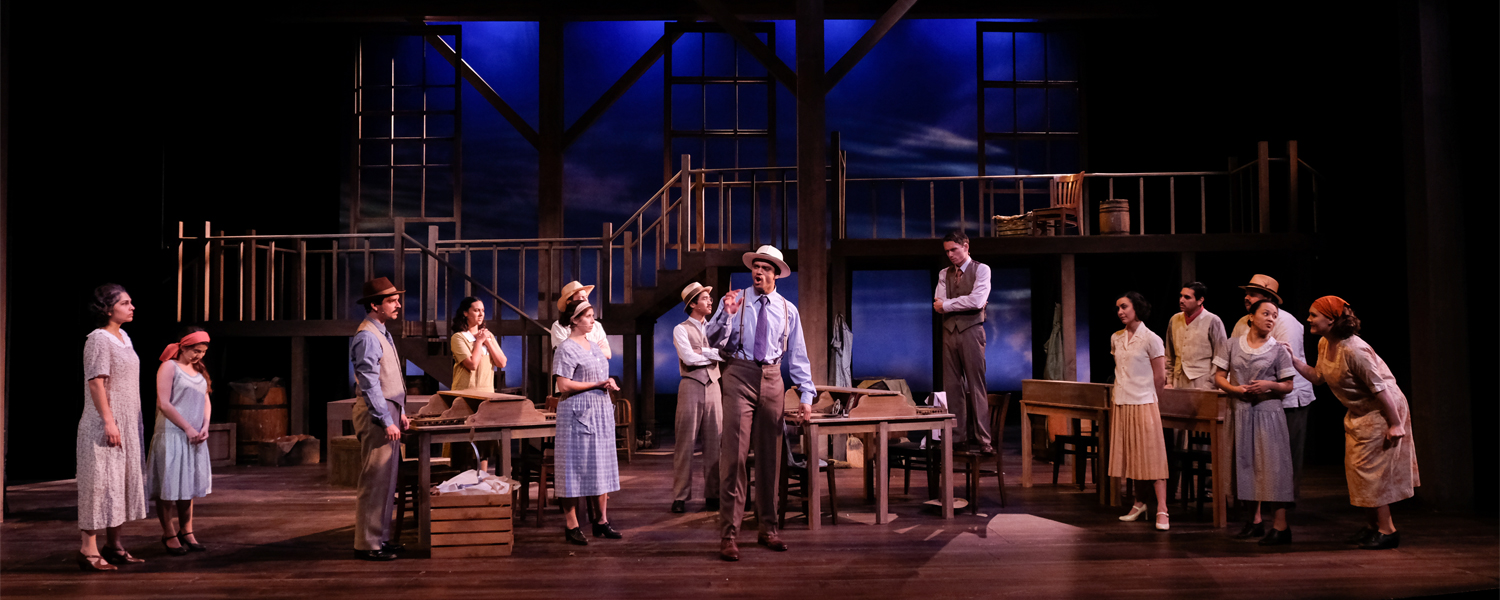Undergraduate Degree Learning Outcomes
The School of Theatre, Television, and Film provides high quality education for undergraduate and graduate students that emphasizes excellence in the arts and technology, grounded in theoretical and historical foundations. The School’s faculty supports students as they work to realize their potential as artists, scholars, leaders, and global citizens. Our academic community celebrates cultural diversity and promotes social equality. We pursue the aspects of this mission through both conceptual explorations and practical experience in the disciplines represented in our School: live performance and the screen arts. TTF courses combine concept and craft to lead students from critical analysis through problem solving to practical action and the production of creative and critical outcomes.
Undergraduate Programs
Download the Undergraduate Curriculum Map
B.A. Musical Theatre
- Voice and Speech
Express thoughts and emotions using singing and spoken voice and alter its use in response to external stimuli - Movement
Express thoughts and emotions through physical poses, gestures, and choreography and alter their physicality in response to external stimuli - Story Analysis
Identify the dramatic elements of a play script or musical libretto including character, plot, given circumstances, and environment and contextualize diverse writings within world history and culture. - Characterization
Synthesize content (from dramatic literature or another source) to create performances in which the given circumstance, a vibrant emotional inner life, and a clear character arc are evident - Career Development
Create materials needed to succeed in the profession and audition for professional performing arts opportunities.
B.A. Theatre Arts, Emphasis in Performance
- Voice and Speech
- Express thoughts and emotions through the use of voice and speech articulator
- Alter the use of voice and articulation in response to external stimuli
- Movement
- Express thoughts and emotions through physical poses and gestures.
- Alter their physicality in response to external stimuli
- Script Analysis
Identify the dramatic elements of a play script including: character, plot, given circumstances, environment - Characterization
Synthesize content (from dramatic literature or another source) to create performances in which the given circumstance, a vibrant emotional inner life, and a clear character arc are evident - Improvisation
Synthesize content (from dramatic literature or another source) as well as external stimuli and contact with / input from other performers to create spontaneous performance.
B.A. Theatre Arts, Emphasis in Youth Theatre
- Community Building
Employ a range of skills in creating conscious community in classrooms, rehearsal rooms and teaching artist spaces - Basic Theatre Knowledge with an emphasis in story analysis and characterization
- Identify the dramatic elements of a play script including: character, plot, given circumstances, environment
- Synthesize content (from dramatic literature or another source) to create performances in which the given circumstance, a vibrant emotional inner life, and a clear character arc are evident
- Adaptation and Devising
Demonstrate competence in adapting source material and/or devising new work for young audiences - Lesson Plan Development
Gain competency in the basics of lesson plan development for theatre arts settings and linking to California State Standards - Pathway to Employment: Local Community Teaching Artist Community and K-12 Classroom
Create materials and make contacts needed to take next steps towards a career as a teaching artist or classroom teacher
B.A. Theatre Arts Design and Technology
- Applied Research
Demonstrate knowledge of research methods and techniques for communication in the arts. - Aesthetic Competence
Demonstrate knowledge of a range of art forms as well as the ability to come up with creative solutions to design problems — both theory and practice in the context of Design for theatre and film. - Literary Competence
Extensive comprehension of and familiarity with dramatic literature (literature for the theatre) - Critical Analysis
Capacity to critically analyze both dramatic literature and theatrical productions (live performance) - Mastery of Discipline-Specific Techniques
Employ a range of skills relevant to the crafts and technologies associated with theatre and film design. - Business Competence in the Field
Demonstrate competence in business aspects of the profession, including production processes, budgeting concerns, and portfolio presentation
B.S. Television, Film, and New Media, Emphasis in Production
- Communication and Research
- Demonstrate knowledge of research methods and techniques for communication (oral and written).
- Aesthetic Competence
- Demonstrate knowledge of a range of film forms with both direct and indirect applicability to filmmaking.
- Technical Competence
- Comprehension of and familiarity with the tools and practices of professional film and / or television production.
- Critical Analysis
- Capacity to critically analyze a range of cinematic forms, including screenplays / teleplays, TV episodes, webisodes, and short films, and feature films. Ability to apply this analysis in both critical and production contexts.
- Developing a Cinematic Imagination
- Employ a diverse range of competencies relevant to the craft of filmmaking to produce work that visibly demonstrates depth of meaning.
- Business Competence in the Field
- Demonstrate competence in business aspects of the profession, including production processes, budgeting concerns, and concept presentation (pitching).
B.S. Television, Film and New Critical Studies
- Diversity Analysis
- Demonstrate knowledge and understanding of the construction of meaning in portrayals of race/ethnicity, gender, and sexuality.
- Genre Analysis
- Demonstrate an understanding of various film and television genres and produce nuanced analyses of generic elements in films and television programs.
- Historical Analysis
- Recall, explain, and discuss key aspects of film history from a global range of cinematic production.
- Director / Auteur Analysis
- Students will identify a wide variety of international film masters.

